- Home
- Kristin Harmel
Life Intended (9781476754178) Page 7
Life Intended (9781476754178) Read online
Page 7
I shrug. “Why do you ask about kids?”
“I just want to know.”
Again, I stay quiet, waiting for him to go on. Silence can often be as effective as sound when you use it correctly. After a moment, he returns to playing the melody of the Beatles song, almost absently. “I bet you wouldn’t let someone beat up on your kid,” he says in a small voice when he stops playing again. “I bet you’d care enough.”
So that’s what his questions are about. “Leo, what’s happening at school isn’t because your parents don’t care about you.”
His jaw tightens. “My dad keeps saying I got to just stick up for myself and hit Tyler back. But Tyler would beat the crud out of me. Or his friends would. You think my dad wants me to get beat up?”
“Absolutely not, Leo. He’s just telling you that sometimes, bullies won’t push around someone who stands up to them.”
“Yeah, well, I bet you wouldn’t let your kid go and get creamed, if you had a kid,” he grumbles. “I bet you’d fix things and help your kid to be happy.”
I’m at the stove making shrimp scampi that night when Dan gets home.
“Dinner smells great,” he says, coming up behind me and nuzzling my neck. “I love it when you cook, babe.”
“Why don’t you open a bottle of wine? And would you mind setting the table?”
“Sure.” He opens a bottle of sauvignon blanc, pours us each a glass, then heads into the bedroom to change out of his suit and tie. A minute later, I can hear the shower running, which annoys me a little. He knows the meal is almost ready. Patrick never would have done that, I think, but I catch myself and banish the thought. It’s not fair to compare my former husband with my future one.
But as I set the table myself, top off my wine, and pour us each a glass of water, I can’t help but think how different this feels. Dan’s a great guy, just like Patrick was, but in a way, the similarities end there. For the first time, I find myself wondering if what attracted me most to Dan is simply that he was so different from Patrick. He’s perfect and glossy, a storybook prince, while Patrick was rough and warm and endearingly imperfect.
As I pile pasta onto two plates and add shrimp and buttery garlic sauce, I feel a pang of sadness. Patrick and I used to cook for each other all the time, and I loved that we had a sort of intimacy in the kitchen. We were a team; if he was cooking, I was chopping vegetables or washing dishes. If I was cooking, he was pouring wine or setting the table. We had an easy sort of we’re-in-this-together camaraderie that’s just not there with Dan.
Patrick and I used to communicate in our own sort of shorthand too. I could say a single word, and he’d almost always know exactly what I meant. He’d say, Lynn, for example, and I’d know he’d had a tough day at the office with his boss and that he needed a few minutes alone to unwind. I’d say, Five, and he’d know dinner would be ready in five minutes and he should start pouring our water. He’d breathe Katielee in a low voice, and we’d always look at each other for a moment before dropping everything we were doing and heading for the bedroom. There were a thousand words between us that spoke volumes, but I can’t think of a single one that Dan and I share.
I don’t even know the stories of Dan’s childhood, the things that shaped him. I don’t know what he wanted to be when he grew up, or what his school social life was like, or what books and movies he liked as a boy. Yet I can still name Patrick’s elementary-school best friend, tell the tale of the day he got into a fight in seventh grade defending a girl he had a crush on, and recite a list of his career aspirations in chronological order from garbage man to astronaut to chef to pilot to financial analyst.
Does the fact that I don’t know those kinds of things about Dan mean that something’s broken between us? Or is it just a logical result of beginning to date when we were older, at a time in our lives when childhood felt further away?
“What were you like in high school?” I ask almost desperately as Dan sits down at the table a few minutes later. He’s wearing pajama pants and a T-shirt, and he smells like soap.
He takes a bite of pasta and a sip of wine before answering. “I don’t know. The same as I am now, I guess. Why?”
“I just feel like I don’t know about your past as much as I maybe should.”
“Okay,” he says, giving me a strange look.
“So tell me about it,” I say. Maybe I can use the shreds of information he gives me to patch the holes I’m beginning to see between us. “Your past, I mean.”
“You’re acting weird.”
“Just humor me.”
He shrugs. “All right. School was never really an issue. I always did well. I played soccer in junior high and football in high school, so I was always pretty popular. Never really had any problems with the other kids. I was actually the prom king. Haven’t I told you that before?”
I ignore the question, because in fact I’ve heard it at least a dozen times. “But there had to have been a time when you struggled,” I protest. “A time when you were bullied, or when you were sad, or when you just had a bad few months.”
“Not that I can recall.” He looks at me more closely. “Why? Were you bullied?”
“No,” I say, suddenly desperate to share. “But I had rough patches in school. Fifth grade, for example. We’d just moved to a new school district, and all the kids in my class wore designer clothes and arrived in their parents’ expensive cars. I took the bus, and my favorite outfit was a Superman T-shirt and polka-dot skirt, which I wore all the time. I got made fun of a lot that year.” I smile, intending for the words to be funny, but he just looks confused.
“But why would you keep wearing something that made you the butt of jokes?” Dan asks, taking another bite of his pasta.
I stare at him. “I was just being myself,” I say. “And I was ten. What did I know about fashion?”
“Just strikes me that it would have saved you a lot of trouble if you just tried to fit in,” he says with a shrug. “But maybe I’m not getting it. Why are you telling this story, anyway?”
“I don’t know,” I say in a small voice. “I just thought it would be nice to learn a little more about each other.”
He shrugs and goes back to eating, but I’ve lost my appetite. I pick at my food and try not to think about the fact that when I told Patrick about my fifth-grade fashion sense and the trouble it caused, he came home from work the next night with a Superman T-shirt for me. This is to remind you that you should never stop being yourself, no matter what, he’d said. Because I think you’re the most incredible person in the world.
That night, Dan sits in the living room and answers e-mails while I take my laptop to bed and once again google American Sign Language. When Dan comes to bed just past 10:30, he walks in on me signing the sentence I love you more than you can imagine.
“What are you doing?” he asks.
“Nothing,” I say, snapping my laptop closed.
“Is that sign language?” He nods to my hands. “Were you signing?”
“Well . . . yeah.”
“Why?”
“For a client I’m working with.” As I hear myself lie, I know it’s too late to take it back.
He laughs. “You’re a music therapist,” he says. “Why would you work with a deaf kid?”
I resist the annoyance that washes over me. After all, there’s no reason to expect someone outside my field to know that people who are deaf can still experience sound though vibration and visual cues. “Music therapy with deaf kids actually isn’t that uncommon,” I tell him. “And hard-of-hearing kids can usually hear some residual sounds anyhow.”
He chuckles. “Next you’re going to tell me you’re setting up stargazing trips for the blind.”
“I’m sure there’s a way to do that too,” I tell him. “Braille constellations or something. People shouldn’t miss out on something just because they have a dis
ability.”
“But music? For deaf kids? C’mon, Kate.”
“Music isn’t just about hearing with your ears.”
“Now you sound like one of those nutty new-age people.”
I exhale slowly through my nose. “No. I just sound like a music therapist trying something new.” But I realize as I say it that I don’t know much about music therapy for deaf and hard-of-hearing kids at all.
I make a mental note to look into it further when I have time. Then again, maybe that’s foolish. What am I going to do, comb through the journals for information on music therapy for deaf children just so that I can pick out a few songs on the guitar if I ever dream about Patrick and Hannah again? It sounds crazy even to me.
Eight
The entrance to St. Paula’s, the Catholic church on the corner of Seventieth and Madison, is lit by two torches that illuminate the shadow-cloaked stairs, and as I push open one of the heavy wooden doors, the faint scent of frankincense lingers in the air, triggering a handful of memories. I’d gone to church almost every Sunday with Patrick, but after he’d died, I’d had trouble understanding how God could have taken my husband like that. As a result, I’d simply stopped attending, and now I feel guilty as I look up at the cross. “I’m sorry,” I murmur.
“Looking for the sign language class?” asks a deep voice behind me. I whirl around, startled, to see a man with glasses, a square jaw, and sandy hair sprinkled with gray standing a few feet away, near an open door to the left of the front entrance. When I nod, he smiles. “You can continue your conversation with God if you want, but when you’re ready, we’re down in the basement. Welcome.”
He doesn’t wait for a reply before disappearing down the stairs. I glance once more at the crucifix, feeling foolish, and hurry after him.
In the small church basement, I find three women and a man sitting on folding chairs in the center of the room, facing a big easel on which the sandy-haired man from upstairs is currently writing. One of the women, who looks about my age, with dark, pin-straight hair, nods at me as I enter, and the man at the easel turns as I sit down in a squeaky chair.
“You must be Katherine Waithman,” he says.
“Kate,” I tell him.
“Well, welcome to class, Kate,” he says. He sets down the marker he was using, and I see he’s written several phrases on the easel. “I’m Andrew Henson, the instructor from GothamLearn. These folks started with me last week, but if you want to stay a few minutes after class, I’d be happy to catch you up. Sound good?”
“That’s nice of you. Sorry I wasn’t here for the first class.”
“Hey, what matters is you’re here now.” He turns to the others in the class and says, “We’re just waiting for Vivian, then we’ll get started, guys.”
He turns back around and continues adding phrases to the list on the easel. I see I love you, New York City, My name is ____, and Have a nice day. He’s just adding, How’s the weather, when the dark-haired woman scoots her chair toward me.
“I’m Amy,” she says.
“Kate.” I shake her hand. “So you were here last week?”
She nods. “I work at a bank; I’ve been meaning to learn the basics of sign language for a while because we have a few regular customers who are deaf.”
“Well, that’s nice of you.”
“Actually, that’s a lie.” She shrugs. “I mean, I do work at a bank. But a friend of mine took this class last semester and told me how hot the instructor is. I figured it was worth the price of the course to see for myself.”
I smile and follow her eyes toward Andrew, who’s shuffling through a stack of papers. “I guess he’s pretty cute,” I say. “In a nerdy professor kind of way.”
“Yeah, if Matt Damon was playing the role of nerdy professor,” she says with a laugh. “Looks like you already have someone anyhow. Good. Less competition for me.”
I follow her gaze to my left hand and am almost startled to see a ring on my finger. “Oh, right. I’m still getting used to this thing.”
“Well, you’re lucky,” she says. “Dating in New York is a nightmare. Hang on to that guy.”
I force a smile, feeling uneasy. After all, I’m here because of my old husband, not my future one. “I will,” I tell her anyhow. Then, because it’s polite, I add, “I’m sure your guy is out there.”
She glances at Andrew. “Or in here.”
We’re interrupted by the arrival of a sixtysomething woman with her hair dyed carrot orange. She’s wearing a long purple skirt, a black sweater, and a flowing green scarf that grazes the ground. “Sorry I’m late!” she says, still panting from her rush down the stairs. “Begin, begin, don’t wait for me!”
Andrew smiles at her. “Ah, Vivian,” he says. Then he signs something to her as she slides into the seat to my right.
She looks perplexed. “I assume that means ‘Get your act together, crazy lady,’ ” she says.
He laughs. “It actually just means welcome to class.”
She sighs loudly in mock relief and wipes the back of her hand across her forehead. Andrew waits to begin while she digs in her giant bag for a notebook and a pen.
“Ladies and gentleman, welcome to our second night of American Sign Language for Beginners,” he says, pausing to go around the room and lock eyes with each of us. “Vivian, Amy, Diane, Shirley, Greg, you all began this journey last week. Let’s all give our newest student, Kate, a big welcome.”
I expect a smattering of claps, or a chorus of hellos, but instead, Vivian and Amy both give me what appears to be a salute, and the others move their outstretched, upturned right hands toward their rib cages. I glance at Andrew, who grins at me. “Kate, Vivian and Amy just said hello, and the others said welcome.” He turns his attention back to the rest of the room. “Great job, guys! I see you retained at least some of what I taught you last week. Kate, how about saying hello back?”
I hesitate, feeling foolish, but Vivian smiles encouragingly, and I give her a weak salute.
“Great start, Kate,” Andrew encourages. “But make sure you own the action. In American Sign Language, hesitating or flimsy-arming, as I call it, is sort of like mumbling out loud. Want me to show you how to thank your classmates for welcoming you?”
“Uh, sure,” I say.
“Watch this,” he says. He puts his right hand in front of his chin, just below his lips, and moves it outward, almost like he’s blowing me a kiss. “That’s thank you,” he says. “You try it.”
I put my hand in front of my chin uncertainly, but he arches an eyebrow, so I finish the motion with a definitive kiss-blowing motion forward.
“Nice!” he says. “You’re a natural. Now, folks, I know we learned a bunch of basic phrases last time, and I’ll show those to Kate after class. Today, I thought it would be handy to learn and memorize the alphabet, and then we can conclude the session with each of you choosing a phrase for me to teach you. So as we work today, be thinking about what you want to say.”
Andrew passes out printed charts of each of the letters in American Sign Language and spends the next hour showing us each letter and patiently waiting for us to repeat them back to him. It should feel tedious, but it doesn’t. Andrew keeps us laughing by demonstrating sign language puns as we go, such as using his right hand to make a D and his left to make a U, then knocking the U over with the D to form an H. “That’s an ASL pun for duh,” he tells us with a grin.
He also peppers the lesson with explanations about why knowing the letters is so important. “Most people who are proficient in sign language know somewhere south of ten thousand signs,” he explains, “and many know far fewer than that. But there are a quarter of a million distinct words in the English language, maybe one hundred fifty thousand of which are in regular usage today. Think about what a huge gap that is. So knowing how to fingerspell is important, especially for names or other proper nouns
and for words you simply don’t know yet. For beginners like you guys, fingerspelling will be your lifeline for a while. When in doubt, spell it out.”
He has us practice with each other while he steps out to make a quick phone call, and when I pair up with Vivian, I find myself really appreciating the beauty of signing. There’s something graceful about fluidly moving one’s hands into shapes that represent words, but by the time Andrew returns to the basement, Vivian and I have abandoned elegant signing and are repeating duh to each other and giggling like children.
“Okay,” Andrew says, coming back into the room and looking at us with an amused expression on his face. “I see you’ve all mastered the art of duh-ing. How about we conclude class by learning one expression each of you would like to say? Who wants to go first?”
Greg, who looks like he’s in his midtwenties, raises his hand, and when Andrew nods at him, he says he’d like to learn, Do you need help with those groceries? “There’s a deaf girl who lives on the fourth floor of my building,” he says, his face turning red. “I want to learn to talk to her.”
Andrew smiles and nods. “Try this,” he says. He points at Greg, then, with his palm open toward himself and his fingers splayed, he makes a quick clockwise circle in front of his face, closing and opening his fingers again in the final motion before pointing at Greg again. He has Greg repeat the motion a few times, then he asks us all to try. “Good,” he says with a grin when we’ve all mastered it. “Now you all know how to say, You’re beautiful, which is, I think, what Greg really wants to say.” We all chuckle, and Greg turns even redder, but he’s smiling. “But now, if you insist, I’ll show you how to ask about groceries.”
We all repeat the motions he shows us, then Amy asks how to say, How can I help you today? Next, Shirley, a heavyset woman with graying hair, asks how to ask where the park is, and Diane, who looks like she’s in her midforties, wants to know how to say, My nephew is hard of hearing.

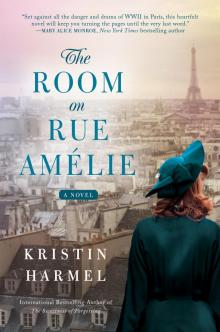 The Room on Rue Amélie
The Room on Rue Amélie The Winemaker's Wife
The Winemaker's Wife The Forest of Vanishing Stars
The Forest of Vanishing Stars The Book of Lost Names
The Book of Lost Names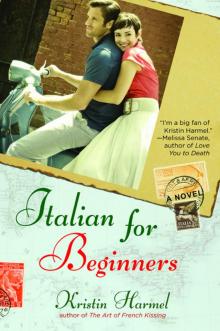 Italian for Beginners
Italian for Beginners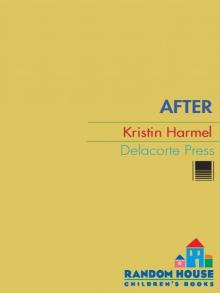 After
After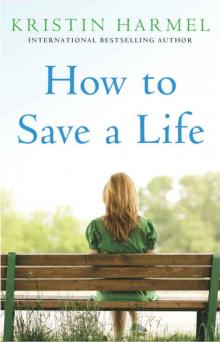 How to Save a Life
How to Save a Life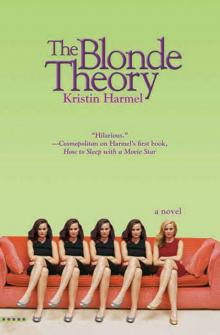 The Blonde Theory
The Blonde Theory The Sweetness of Forgetting
The Sweetness of Forgetting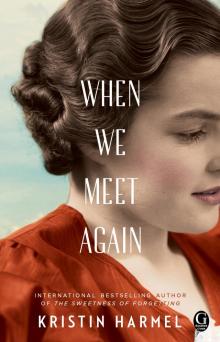 When We Meet Again
When We Meet Again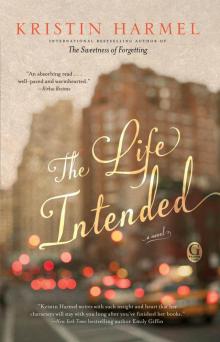 Life Intended (9781476754178)
Life Intended (9781476754178)